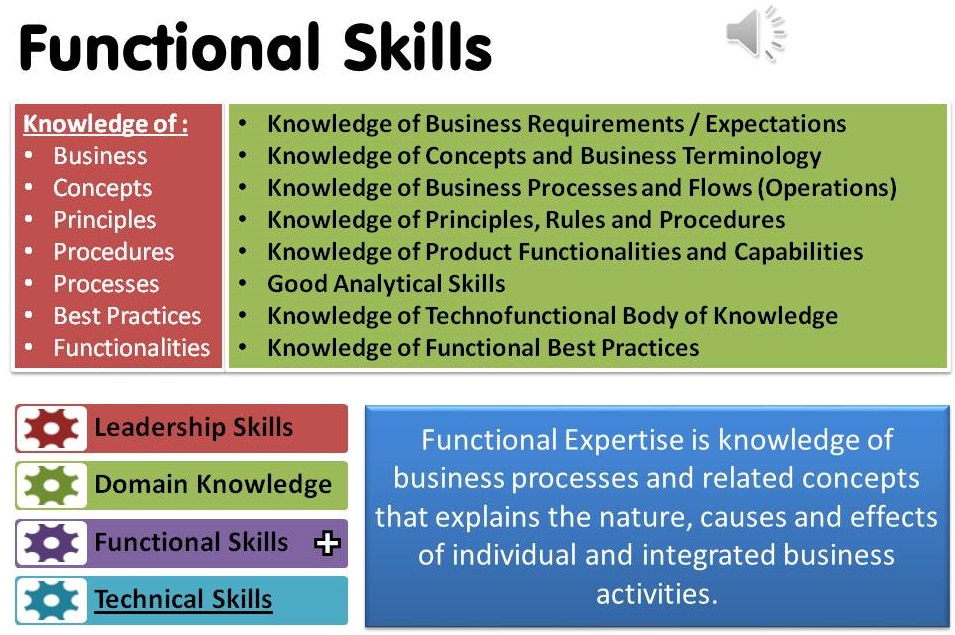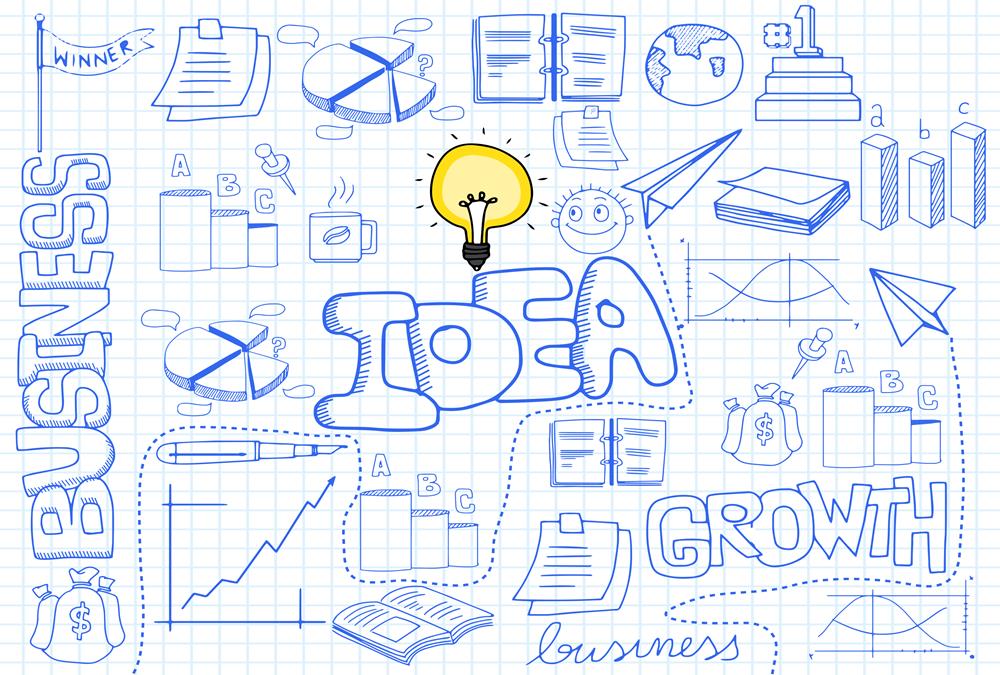- Home
- Business Processes
- Industry Knowledge
- Aerospace Industry
- Automotive Industry
- Banking Domain
- BFSI Industry
- Consumer/ FMCG Industry
- Chemicals Industry
- Engineering & Construction
- Energy Industry
- Education Domain
- Finance Domain
- Hospitality Domain
- Healthcare Industry
- Insurance Domain
- Retail Industry
- Travel and Tourism Domain
- Telecom Industry
- Leadership Skills
- eLearning
- Home
- Leadership Skills
- Career Management
- Developing Functional Skills
Developing Functional Skills
Functional skills are the core competencies that can be transferred to different work areas like understanding of finance is independent and a finance expert can comfortably adapt to a manufacturing or service industry. Functional skills are obtained by understanding the various processes and the principles applicable to a business function. Functional experts are in great demand as they are specialists and required to manage the business processes like human resources, operations, or finance.
Ah, mastery... what a profoundly satisfying feeling when one finally gets on top of a new set of skills... and then sees the light under the new door those skills can open, even as another door is closing.
What are Functional Skills
Functional Expertise is knowledge of business processes and related concepts that explains the nature, causes, and effects of individual and integrated business activities. Functional Knowledge is the practical, tangible, and usable knowledge of a particular business function enabling the possessor capable of performing that activity. Functional skills can be adapted from one business area to another and these skills are generally transferable across multiple business domains.
What are Functional Skills in Business
By functional knowledge, we refer to the knowledge of business processes. The functional leader shows broad knowledge of and interest in business products, systems, and duties and/or shows competence in a specialized functional area.
- Simply speaking it is the knowledge of business and its processes
- Concepts that tell you the “why” of things that is why someone does a particular task or activity
- Knowledge of Principles – the rules of the functional area and procedures to perform different tasks.
- Functionalities or capabilities of the application or product or software solution that is being planned to be used for a particular process
- Best Practices.
Importance of Functional Knowledge & Skills
In IT Implementations two types of knowledge experts are needed, one of the business experts who provide the knowledge about the current business process and their expectations of the future automated system. These expectations are converted into software code by technical experts who specialize in various technologies and understand computer terminology and language.
Functional Skills in IT & Software Industry
Functional Consultants are the experts having knowledge of concepts and business processes with an understanding of business flows with the added capability to analyze underlying software functionalities in comparison to business expectations.
Functional Consultants are generally process-specific like Finance, HR, Manufacturing, and Procure to Pay, etc. They have educational background and experience in the relevant business process area, for example, you will find a Chartered Accountant working as a General Ledger Functional Expert. They acquire ERP or “Other Software Product” knowledge by undergoing a short training on ERP Module they are working in. Functional knowledge of business processes and software makes a good Functional Consultant.
Examples of Functional Skills
Some examples of functional knowledge and skill areas are:
- Fixed Assets (Acquire to Retire Process)
- Cash Management and Bank Reconciliation Processes
- Customer Relationship Management
- General Ledger and Record to Report Process
- Human Resources Processes including Payroll Management
- Manufacturing Processes including accounting for costs and inventory
- Order to Cash Process including accounts receivables
- Procure to Pay including supplier management and accounts payable
- Plan to Perform Process (Projects)
- Tax and Compliance
- Treasury Management
A good Functional Consultant will have an in-depth understanding of the business processes, product features, and the ability to propose a solution for the business requirements.
How to Improve Functional Knowledge and Skills
Gaining functional knowledge for a technical expert can be challenging, but very rewarding as demand for professionals who have both technical expertise and a strong foundation of business process expertise is ever increasing in today’s globalized economies. In the present era of globalization and liberalization, to deliver consistently, technical experts are required to reorient their historical approach of concentration on the technology and code development, and convert their expertise to a professional; who is not only technically sound; but who can understand the language business speaks. Similarly, it is becoming important for a functional expert; to gain technical excellence by understanding technical capabilities, development standards; and controls; to recommend a good functional design for the business.

Functional Knowledge V/s Domain Knowledge
Functional knowledge is the knowledge that can be included in different domains. The knowledge that may be efficient in every domain is called domain-independent knowledge or functional knowledge, for example – financial processes (order to cash processes, procure to pay processes). All of these processes share some common logic and fundamentals that remain true and valid for all domains and different businesses. The best functional best practices can be easily leveraged across different business units, geographies, or products.
What does Functional Excellence mean?
By its very nature, functional excellence comes from functional expertise, and the applicant is able to demonstrate confidence in a function to deliver on the company's goals and objectives. Functional excellence is the ability to demonstrate a depth of knowledge and skill in a functional area. It further means being aware of the following attributes:
1. Customer Orientation
- Offers not only standard solutions and/or products
- Develops individual solutions according to customer needs
2. Result Orientation
- Achieves planned individual results and acts as a facilitator of team target achievement
- Understands the impact of own action on team/function results
- Supports functional team regarding result/target achievement
3. Service Orientation
- Follows a clear, self-driven service approach: is sensitive towards customer needs and requirements
- Acts pro-active
4. Business Knowledge
- Shows broad knowledge of and interest in business products, systems, and duties and/or shows competence in a special area
- Has a deep understanding of his/her function within the business, is aware of dependencies to other functions
- Knows how to use knowledge for his/her function
What to write in functional skills in a resume?
Functional knowledge helps professionals understand how a company operates and what are the standard business processes. It talks about the best practices in particular areas. This understanding of the knowledge of business fundamentals helps executives to think strategically and then take appropriate business decisions. It adds to their ability to think and take timely and appropriate business decisions.
Functional Skills Questions & Assessment
Many companies today want to assess their candidates on functional expertise. Most of the modern job-profiles demand more specialized skill sets and employees want to assess their potential candidates on functional skills and domain capabilities.
TechnoFunc has created function/process-based assessments to help organizations measure a wide variety of process expertise and help students take functional knowledge tests and gain certifications. This helps candidates to do a self-assessment for evaluating themselves for a particular domain or a functional process area. Recruiters can evaluate the expertise of job seekers with the expert-curated questions provided in these business process-based assessments. The questions are presented in the form of multiple-choice and multiple answers. These TechnoFunc Functional assessments can also be used in employee development to facilitate the up-skilling of employees. The test results provide clarity on the areas that need improvement, which helps to create personalized training programs for workforce development as per industry standards.
How TechnoFunc helps?
Our functional knowledge resources help you gain a fundamental understanding of different business processes which helps in the development of strategic skills. Clubbed with good leadership and managerial skills it helps business executives to drive efficiency and effectiveness meeting business objectives.
Explore our section on Functional Knowledge to learn fundamentals and standard business processes. Browse process-specific tutorials by clicking on the image for the business process area of your interest.
The function is, essentially purpose. When we use the word function we are saying that something has a purpose. So when we apply that term to training for the workplace we are talking about purposeful training.
Related Links
You May Also Like
-
The best career choices are ones that match your values. Each person has several values that are important to him. These values are highly personal and knowing them provides a clearer sense of what's most important to you in your life and career. Career values are the beliefs you consider important from a work standpoint. Values help you understand what you want from a job? Explore a few examples of work values that can influence career path and job satisfaction.
-
A manager or an employee in an organization who is experiencing a high level of stress may develop high blood pressure, ulcers, irritability, difficulty in making routine decisions, loss of appetite, accident proneness, and the like. These can be subsumed under three general categories, physiological, psychological, and behavioral symptoms. Stress can give rise to a number of changes.
-
Functional skills are the core competencies that can be transferred to different work areas like understanding of finance is independent and a finance expert can comfortably adapt to a manufacturing or service industry. Functional skills are obtained by understanding the various processes and the principles applicable to a business function. Functional experts are in great demand as they are specialists and required to manage the business processes like human resources, operations, or finance.
-
How often do you have a plan for how you are going to spend your day but you aren't able to complete the tasks on your plan because of unimportant tasks, interruptions, or your own procrastination? Wouldn't it be great to be able to manage your schedule and your time while avoiding, or at least controlling, these time stealers? Learn the strategies to manage your schedule while still handling interruptions and demands on your time.
-
In the early years, most jobs were skill-oriented, and with the development in lifestyles and technology, the current jobs are knowledge-oriented jobs such as management, accountants, design, or computing. Career paths encompass varied forms of career progression and this article discusses how we can build a fulfilling career? Learn here about career paths, industries, and opportunities for gaining experience in the field of your choosing.
-
Navigating your career journey will hopefully include a series of experiences that challenge your skills and abilities in ways that are satisfying and rewarding. Only you can manage your career. That means you must determine what things you are passionate about, what your goals are, both professionally and personally, and how much energy you are willing to invest along the way. Learn how to build an effective career path framework for yourself.
-
Improving Skills & Competencies
Whenever you are looking for a job or having your yearend discussion with your manager, two terms generally referred to be “Skills” and “competencies”. Today success in a career is an outcome of having essential competencies and building required skills. Skills could be a major distinguishing factor for you to move up on the career ladder and jump from one role to another. Leadership skills when combined with relevant domain and functional expertise can transform your entire career growth and help you have a fulfilling career.
-
Narrative leadership is interpreted as the leader who aspires to construct leadership by telling stories. Leadership is a task of persuasion, of winning people’s minds and hearts. Storytelling is thus inherently suited for the task of leadership. Learn about the narrative leadership style and how to use this style to inspire and motivate followers or to manage change.
-
A good leadership style is something that every effective leader must have in order to succeed, but identifying what that entails or does not entails might be difficult to understand. Most of the research on leadership focuses on the exemplary, best practices, and positive attributes of effective and successful leaders. This article talks about a new approach to learn leadership using lessons from bad leadership. That is the lessons to be learned by examining leaders who have not effectively exercised their power, authority, or influence.
-
Robert Katz identified three leadership skills called - technical skills, human skills, and conceptual skills as the basic personal skills essential for leadership. Leaders must possess these three skills that assist them in optimizing a leader's performance. Technical skills are related to the field, human skills are related to communicating with people and conceptual skills related to setting the vision.
Explore Our Free Training Articles or
Sign Up to Start With Our eLearning Courses

About Us
Learning
© 2023 TechnoFunc, All Rights Reserved










